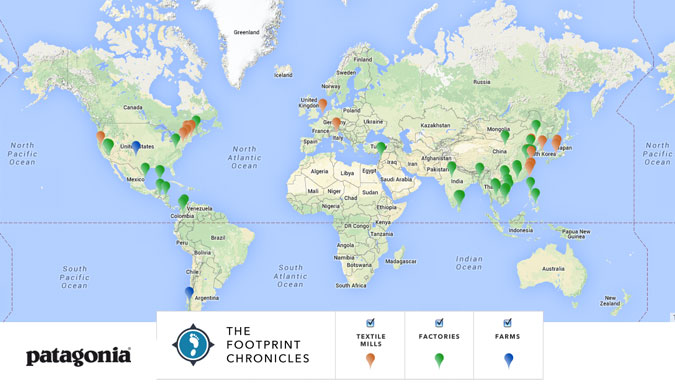
Want to know where your stuff is coming from?
I am a surfer, or at least I was, before I moved from Bondi Beach to Granada in Spain; 40 minutes inland from the beautiful (but waveless) Mediterranean Sea. Later this year, I will attempt to scratch an ever-growing itch and head to Morocco, Portugal and the Basque Country chasing waves. As the winter water temperatures in Northern Spain hover around the 10C mark, I’m going to need a wetsuit.
Thankfully, Google and Facebook’s espionage units have realized I require a wetsuit, and I now receive a daily bombardment of advertisements from surf shops, wetsuit manufacturers, and surf camps in Lisbon, Tagazhout and San Sebastian. Wary of providing further encouragement for the marketers, I tend to ignore these types of ads. But in Granada there are no surf shops, so an online purchase is required.
Yesterday, on my wetsuit search, I clicked my way through to the website of “Lifestyle” clothing and wetsuit provider, Patagonia. I have a bunch of their gear already; it costs a little more, but tends to last longer than their competitors’ kit, so I buy it.
What I found on their site piqued my interest. I’ve worked in both procurement and marketing, and more often than not I’ve found the two functions tend to be at loggerheads with one another. Patagonia, however, seems to have found a symbiotic middle ground few other firms have even attempted to achieve. Patagonia markets their supply chain.
Patagonia markets its supply chain because their supply chain is transparent; it’s open, and it’s ethical. Patagonia markets its supply chain because it offers them a competitive (marketing) advantage. Patagonia markets its supply chain, because their supply is good.
Anyway, back to my wetsuit search. Patagonia’s product pages are laid out much like those of other online clothing retailers. An image of the wetsuit, details about how it will keep you warm, followed by technical specs about materials you’ll never understand, and then suggestions for other items that you might like to buy.
Most other apparel brands stop here, but it’s here that Patagonia differentiates itself; with a project it has dubbed, “The Footprint Chronicles.”
Right there on the product page, Patagonia proudly displays the suppliers that are involved in the production of the wetsuit you are about to buy. “The Footprint Chronicles” tell you where the supplier is located, how long they have been working with Patagonia, and provides a brief overview of what they do.
Look further into Patagonia’s site, and you’ll see more examples of the company’s commitment to an ethical supply chain. Supplier qualifications include social and environment concerns, as well as pricing and quality. This is nothing new, but the depth of coverage Patagonia gives this topic on their site suggests they are actually following through on these promises.
Patagonia allows external audits of its suppliers’ factories and mills and is even beginning to move further down its supply chain to audit the farms that supply cotton to their suppliers.
Before I am labelled an undercover Patagonia propaganda merchant, I would like to openly state that I know all of this is a marketing effort. I know it is designed to encourage me to buy Patagonia products, to consume more. I get the irony, but if Patagonia is marketing its supply chain, then they are taking direct responsibility for it and any issues that lie within it. No lowest cost at all cost mentality, no hiding suppliers away, and no secrets. For that, I applaud them.
CSR is often talked about from a supply chain point of view, but with such a close eye on quality, timely delivery, and price, I feel a lot of the time procurement’s commitment to CSR is little more than a few lines on a web page. It’s easy to say “we have a supplier CSR policy,” but actually implementing one, without jeopardising your operations, is another thing. Creating a publicly transparent supply chain like Patagonia has and then having the conviction to go out and market it, for me, is truly remarkable.
So to Patagonia, I say well done.
PS. You’ve sold yourselves another wetsuit.

